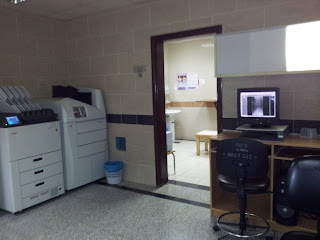I went with my husband to Amiri hospital to have his hand checked and I found the hospital very clean and no chaos compared to Adan hospital. There were signs posted on the door about no knocking and waiting your turn. It was so quiet you could here a pin drop which was amazing. There was even a coffee shop and the proceeds from the items they sell go back into the hospital for programs.
I had to take a picture of the doctor wearing booties over his shoes as I've never seen anyone wear them in government hospitals, if they wear gloves it's a miracle. The x-ray area was organized and clean with young Kuwaiti women taking the x-rays.
A visit to Adan hospital is like visiting a wrestling game. There are 20 people lined up at the door to get at the doctor, they even have security at the door to control the people. The x-ray room is outdated and they don't clean the equipment with alcohol when new patients come in. Everyone is yelling names and you practically have to fight to get your turn. What a difference between government hospitals, I guess it depends on which area you go to. One of CIK readers contacted me for info on Kuwait, he happened to be flying to Kuwait from John Hopkins as he was interviewing for a position here. I found this article on the MOH's effort to improve some of the government hospitals.
The Kuwait Ministry of Health (MOH)
The Kuwait Ministry of Health (MOH) is performing a system-wide restructuring of public health care delivery services. They have engaged Johns Hopkins Medicine International to raise the standards of care at four public hospitals that provide secondary care services:
- Al-Adan: 737 inpatient beds; 730,000+ outpatient visits in 2008—70 percent were emergent
- Al-Amiri: Oldest regional hospital, opened in 1949, 392-beds; 300,000+ outpatient visits per year
- Al-Jahra: Manages major community disasters (fires, major traffic accidents); 700,000+ outpatient visits per year
- Al-Farwaniya: Opened in the 1980s; recent expansion and renovations; approximately 975,000 outpatient visits in 2008
About Our Agreement
Under the agreement signed in 2011, Johns Hopkins Medicine International provides services including:
- Mentoring and training local physicians in clinical practice: protocols, procedures and techniques
- Knowledge transfer activities between local administrative and medical staff and Johns Hopkins experts in the fields of patient safety, performance innovation, health care policy, public health programs and preventive medicine
- Educational activities, including continuing medical education opportunities, conferences, congresses, case consults (teleconference and video conference) and nursing teleconferences/video conferences
- Public health needs assessments, recruitment activities and certification programs
- Assisting the Ministry of Health in assessing and meeting their information management and information technology needs
- Virtual library: consulting and technical advisory services to recommend, design and implement appropriate content management system and user interface
- Remote medical second opinion




No comments:
Post a Comment
Comments are welcome! Personal attacks are not. Thanks!